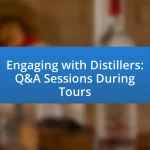The article focuses on how to choose the best distillery tour based on individual taste preferences. It outlines key factors to consider, including the type of spirits produced, the distillery’s reputation, and the educational value of the tour. The content discusses how personal flavor inclinations influence tour selection, the various types of tours available, and the significance of location and regional characteristics on spirit flavors. Additionally, it highlights the importance of engaging with the tour experience, understanding tasting etiquette, and avoiding common mistakes to enhance overall enjoyment.

What Factors Should You Consider When Choosing a Distillery Tour?
When choosing a distillery tour, consider the type of spirits produced, the distillery’s reputation, and the tour’s educational value. The type of spirits, such as whiskey, gin, or rum, directly influences your experience based on personal taste preferences. A distillery’s reputation can be assessed through reviews and awards, indicating quality and visitor satisfaction. Additionally, the educational aspect of the tour, including insights into the production process and tasting sessions, enhances the overall experience, making it more informative and enjoyable.
How do your taste preferences influence your choice of distillery tour?
Your taste preferences significantly influence your choice of distillery tour by guiding you toward experiences that align with your flavor inclinations. For instance, if you prefer sweeter spirits, you may opt for a distillery known for producing flavored liqueurs or sweeter whiskies. Conversely, if you favor bold and smoky flavors, a tour at a distillery specializing in peated whisky would be more appealing. This alignment ensures that the tasting experiences offered during the tour resonate with your palate, enhancing your overall enjoyment and satisfaction.
What types of spirits align with your personal taste?
I prefer whiskey and gin as the types of spirits that align with my personal taste. Whiskey offers a rich variety of flavors, from smoky to sweet, influenced by the grain used and the aging process, while gin provides a refreshing botanical profile that can be enjoyed in cocktails or neat. The diversity in whiskey, such as Scotch, bourbon, and rye, allows for exploration of different regions and styles, enhancing the tasting experience. Similarly, the craft gin movement has led to unique flavor combinations, making it appealing for those who enjoy experimenting with different mixers and garnishes.
How can flavor profiles guide your selection of distillery tours?
Flavor profiles can guide your selection of distillery tours by helping you identify which distilleries produce spirits that align with your taste preferences. For instance, if you enjoy fruity and floral notes, you may want to visit distilleries known for their gin or certain types of whiskey that emphasize these characteristics. Research indicates that distilleries often specialize in specific flavor profiles based on their ingredients and production methods, such as using particular grains or aging processes that influence the final taste. By understanding your preferred flavor profiles, you can choose tours that showcase distilleries with offerings that match your palate, enhancing your overall tasting experience.
What are the different types of distillery tours available?
There are several types of distillery tours available, including guided tours, self-guided tours, tasting tours, and educational workshops. Guided tours typically involve a knowledgeable guide who provides insights into the distillation process and the history of the distillery. Self-guided tours allow visitors to explore at their own pace, often with informational signage. Tasting tours focus on sampling various spirits produced by the distillery, while educational workshops offer hands-on experiences in distillation or cocktail making. Each type caters to different interests and preferences, enhancing the overall experience for visitors.
What distinguishes a whiskey tour from a gin tour?
A whiskey tour is distinguished from a gin tour primarily by the production process and the ingredients used. Whiskey is made from fermented grain mash, which can include barley, corn, rye, and wheat, and undergoes a distillation process that typically involves aging in wooden barrels, imparting distinct flavors over time. In contrast, gin is primarily made from distilled grain alcohol that is flavored with botanicals, particularly juniper berries, and does not require aging, resulting in a fresher and more aromatic profile. The differences in production methods and flavor profiles are crucial for visitors to understand when choosing a distillery tour that aligns with their taste preferences.
How do craft distilleries differ from larger commercial distilleries?
Craft distilleries differ from larger commercial distilleries primarily in their production scale and approach to distillation. Craft distilleries typically produce smaller batches, allowing for greater experimentation and a focus on quality and unique flavors, while larger commercial distilleries prioritize mass production and consistency across their products. For example, craft distilleries often use traditional methods and locally sourced ingredients, which can lead to distinctive spirits that reflect regional characteristics, whereas larger distilleries may rely on industrial processes and standardized recipes to meet high demand. This distinction in production philosophy results in a diverse range of offerings from craft distilleries compared to the more uniform products of larger operations.
Why is the location of the distillery important?
The location of the distillery is important because it influences the quality of the ingredients used and the overall character of the spirits produced. Distilleries situated near natural resources, such as pure water sources and local grain supplies, can create higher-quality products. For example, many renowned Scotch whisky distilleries are located in Scotland, where the unique climate and water sources contribute to the distinct flavors of their whiskies. Additionally, the geographical location can affect the aging process, as temperature and humidity variations play a crucial role in how spirits mature in barrels.
How does the region influence the flavor of the spirits produced?
The region significantly influences the flavor of the spirits produced due to factors such as climate, soil composition, and local ingredients. For instance, the temperature and humidity levels in a region affect the aging process of spirits, with warmer climates accelerating maturation and imparting distinct flavors. Additionally, the mineral content of the soil can influence the taste of grains or fruits used in production, as seen in whiskey from Scotland, where the peaty soil contributes to its smoky flavor. Local water sources also play a crucial role; for example, the limestone-filtered water in Kentucky is known to enhance the quality of bourbon. These regional characteristics create unique flavor profiles that distinguish spirits from different areas.
What should you consider about travel logistics when choosing a distillery?
When choosing a distillery, consider the accessibility and transportation options available to reach the location. Proximity to major airports or public transportation can significantly impact travel convenience. For instance, distilleries located within a short drive from urban centers or near popular tourist routes often attract more visitors due to ease of access. Additionally, check for parking availability if driving, as well as any potential travel restrictions or seasonal road conditions that may affect your visit. These logistical factors can enhance the overall experience by minimizing travel stress and maximizing time spent enjoying the distillery tour.

What Should You Expect from a Distillery Tour Experience?
A distillery tour experience typically includes guided exploration of the distillation process, tastings of various spirits, and insights into the history and production methods of the distillery. During the tour, visitors can expect to see equipment such as stills and fermentation tanks, learn about the ingredients used, and understand the craftsmanship involved in spirit production. Additionally, many distilleries offer tastings that allow participants to sample different products, enhancing their appreciation for the flavors and aromas unique to each spirit. This hands-on experience is designed to educate and engage visitors, making it both informative and enjoyable.
How long do distillery tours typically last?
Distillery tours typically last between one to two hours. This duration allows visitors to explore the distillation process, learn about the ingredients, and often includes tastings. Many distilleries design their tours to fit within this timeframe to ensure a comprehensive yet engaging experience for guests.
What activities are usually included in a distillery tour?
A distillery tour typically includes activities such as guided walkthroughs of the production process, tastings of various spirits, and educational sessions about the history and techniques of distillation. During the guided walkthrough, visitors observe the equipment used in the distillation process, including stills and fermentation tanks, which enhances their understanding of how spirits are made. Tastings allow participants to sample different products, often paired with explanations of flavor profiles and production methods. Educational sessions may cover the origins of the distillery, the ingredients used, and the impact of aging on flavor, providing a comprehensive experience that enriches visitors’ appreciation of the craft.
How does the tour format vary between different distilleries?
Tour formats vary significantly between different distilleries, with each offering unique experiences tailored to their production methods and brand narratives. For instance, some distilleries provide guided tours that focus on the history and craftsmanship of their spirits, often including tastings at various stages of production, while others may offer self-guided tours that allow visitors to explore at their own pace, often supplemented by interactive displays. Additionally, certain distilleries emphasize educational components, featuring in-depth discussions on ingredients and distillation processes, whereas others may prioritize a more casual, social atmosphere with tastings paired with food. This diversity in tour formats reflects the distinct identities and marketing strategies of each distillery, catering to different visitor preferences and enhancing the overall experience.
What kind of tastings can you expect during a distillery tour?
During a distillery tour, you can expect tastings of various spirits produced at the facility, such as whiskey, gin, rum, or vodka. These tastings typically include samples of the distillery’s flagship products, limited editions, and sometimes experimental batches, allowing visitors to experience the range of flavors and styles the distillery offers. Additionally, some tours may include food pairings or cocktails made with the spirits to enhance the tasting experience.
How are tastings structured in relation to the distillery’s offerings?
Tastings at distilleries are typically structured to showcase a selection of the distillery’s core products, often including flagship spirits, seasonal releases, and limited editions. This structure allows visitors to experience the range of flavors and styles produced by the distillery, facilitating a deeper understanding of their offerings. For example, a distillery may present a flight of spirits that includes a classic whiskey, a unique flavored variant, and a special reserve, enabling participants to compare and contrast different profiles. This approach not only highlights the distillery’s craftsmanship but also educates attendees on the nuances of each product, enhancing their overall tasting experience.
What are the etiquette guidelines for participating in tastings?
Etiquette guidelines for participating in tastings include arriving on time, being respectful to hosts and other participants, and refraining from excessive drinking. Participants should also avoid speaking with their mouths full, ask questions politely, and express appreciation for the offerings. These practices ensure a pleasant experience for everyone involved. Following these guidelines is supported by industry standards that emphasize professionalism and courtesy in tasting environments.
What additional experiences might enhance your distillery tour?
Additional experiences that might enhance your distillery tour include guided tastings, food pairings, and interactive workshops. Guided tastings allow visitors to sample a variety of spirits while learning about their production processes, enhancing the educational aspect of the tour. Food pairings, such as cheese or chocolate, can complement the flavors of the spirits, providing a more immersive tasting experience. Interactive workshops, where participants can engage in activities like blending their own spirits or crafting cocktails, offer hands-on learning and deeper engagement with the distillation process. These experiences not only enrich the tour but also cater to diverse taste preferences, making the visit more memorable.
Are there food pairings available during the tour?
Yes, there are food pairings available during the tour. Many distillery tours offer curated food pairings that complement the spirits being sampled, enhancing the overall tasting experience. For example, some distilleries may pair whiskey with cheeses or chocolates, while others might offer local cuisine that matches the flavor profiles of their products. This practice is designed to elevate the tasting experience and provide guests with a deeper appreciation of the spirits.
What unique events or workshops can you participate in?
Unique events and workshops you can participate in at distilleries include whiskey tastings, cocktail-making classes, and distillation workshops. These experiences allow participants to engage directly with the distillation process, learn about flavor profiles, and enhance their tasting skills. For example, many distilleries offer hands-on workshops where attendees can create their own spirits, providing a practical understanding of the craft. Additionally, themed events such as seasonal tastings or food pairing dinners are often organized, showcasing the versatility of the spirits produced.

How Can You Make the Most of Your Distillery Tour?
To make the most of your distillery tour, engage actively by asking questions and participating in tastings. Engaging with the tour guide enhances your understanding of the distillation process and the unique characteristics of the spirits produced. Research shows that interactive experiences lead to better retention of information, making your visit more memorable. Additionally, consider sampling a variety of products to discover your preferences, as many distilleries offer exclusive tastings that highlight their specialties. This approach not only enriches your experience but also helps you identify flavors that align with your taste preferences.
What tips can enhance your distillery tour experience?
To enhance your distillery tour experience, engage actively by asking questions and participating in tastings. Engaging with the tour guide and fellow participants can provide deeper insights into the distillation process and flavor profiles. Researching the distillery beforehand can also help tailor your experience to your taste preferences, as knowing the distillery’s specialties allows for more informed questions and choices during tastings. Additionally, taking notes during the tour can help you remember specific flavors and techniques discussed, which is beneficial for future reference.
How should you prepare for a distillery tour?
To prepare for a distillery tour, research the distillery’s offerings and schedule in advance. Understanding the types of spirits produced, such as whiskey, gin, or rum, allows you to align your preferences with the distillery’s specialties. Additionally, checking the tour times and booking in advance ensures availability, as many distilleries have limited slots. It’s also advisable to consider transportation options, as some tours may include tastings that could affect your ability to drive afterward.
What questions should you ask your guide during the tour?
During the tour, you should ask your guide about the distillation process, the ingredients used, and the flavor profiles of the spirits being produced. Inquiring about the distillation process provides insight into the craftsmanship and techniques that influence the final product. Asking about the ingredients reveals how different elements contribute to the taste and quality of the spirits. Additionally, understanding the flavor profiles helps you identify which products align with your personal preferences, enhancing your overall experience.
How can you share your experience with others?
You can share your experience with others by writing reviews on platforms like TripAdvisor or Google, where many users seek recommendations for distillery tours. Sharing detailed accounts of your visit, including specific aspects such as the quality of the spirits, the knowledge of the guides, and the overall atmosphere, helps others make informed decisions. According to a 2021 survey by BrightLocal, 87% of consumers read online reviews for local businesses, highlighting the importance of sharing personal experiences to influence potential visitors.
What are the best ways to document your distillery tour experience?
The best ways to document your distillery tour experience include taking detailed notes, capturing photographs, and collecting tasting notes. Detailed notes allow you to record specific information about the distillery’s history, production methods, and unique offerings, which can enhance your understanding and appreciation of the spirits. Capturing photographs provides visual memories of the tour, showcasing the distillery’s environment, equipment, and any special events or tastings. Collecting tasting notes helps you remember the flavors and aromas of the spirits you sampled, enabling you to compare them later and refine your preferences. These methods collectively create a comprehensive record of your experience, making it easier to share with others or revisit your memories in the future.
How can you recommend distillery tours to friends based on your experience?
I recommend distillery tours to friends by sharing my personal experiences and highlighting specific aspects that made the tours enjoyable. For instance, I emphasize the quality of the spirits tasted, the knowledge of the guides, and the unique features of each distillery, such as their production methods or historical significance. My recommendations are based on firsthand experiences, such as visiting a distillery known for its award-winning whiskey, which enhances credibility. Additionally, I suggest tours that offer interactive elements, like tastings or blending sessions, as these create memorable experiences. By providing detailed accounts of what to expect, I help friends make informed decisions that align with their taste preferences.
What are common mistakes to avoid when choosing a distillery tour?
Common mistakes to avoid when choosing a distillery tour include failing to research the distillery’s reputation, overlooking the type of spirits produced, and not considering the tour’s duration and schedule. Researching the distillery’s reputation ensures a quality experience, as established distilleries often provide better insights and tastings. Understanding the type of spirits produced is crucial, as different distilleries specialize in various products, which may not align with personal preferences. Additionally, considering the tour’s duration and schedule helps avoid rushed experiences or conflicts with other plans, ensuring a more enjoyable visit.
How can you ensure you select a tour that matches your expectations?
To ensure you select a tour that matches your expectations, clearly define your preferences regarding the type of distillery experience you desire. This includes considering factors such as the specific spirits you enjoy, the level of interaction you seek, and the overall atmosphere you prefer. Researching distilleries that specialize in your favored spirits, such as whiskey or gin, can help narrow your options. Additionally, reading reviews and testimonials from previous visitors provides insight into the quality and style of the tour, allowing you to gauge whether it aligns with your expectations. For instance, a distillery known for its intimate, hands-on tours may be more suitable for someone looking for a personalized experience compared to a larger facility that offers a more general overview.
What should you avoid doing during a distillery tour to enhance your experience?
During a distillery tour, you should avoid excessive talking or interrupting the guide. This behavior can detract from your understanding of the distillation process and the nuances of the spirits being produced. Engaging in side conversations can lead to missing important information and insights shared by the guide, which are essential for a comprehensive experience. Additionally, being overly critical or dismissive of the spirits being tasted can create a negative atmosphere, impacting both your enjoyment and that of fellow participants.


